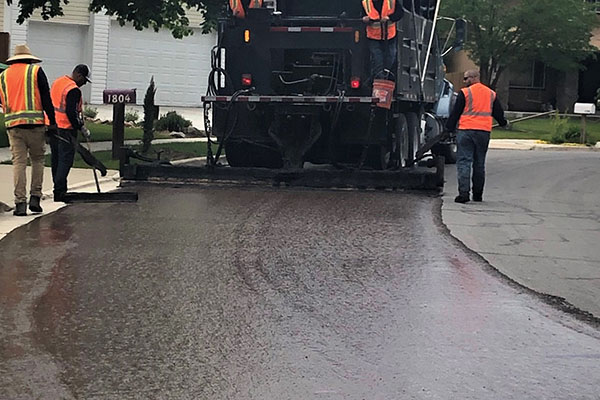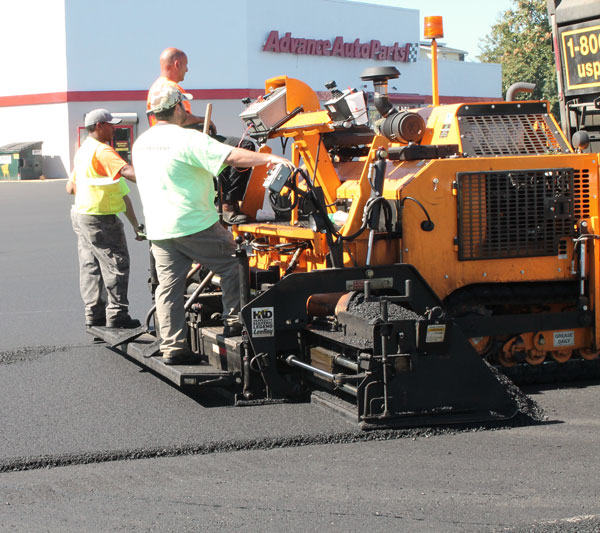Affordable and Durable Paving Service Near You
Affordable and Durable Paving Service Near You
Blog Article
A Review of the Kinds Of Asphalt Paving Available With Expert Paving Provider
In the realm of building and construction and framework, comprehending the different sorts of asphalt paving is important for making informed decisions. Specialist paving services supply a variety of options, consisting of Hot Mix Asphalt, understood for its durability, and environment-friendly alternatives like Warm Mix Asphalt. Furthermore, remedies such as Cold Mix Asphalt and Permeable Asphalt deal with certain requirements, while Recycled Asphalt Pavement stresses sustainability. Each type supplies distinct benefits, however the selection ultimately depends on task demands and conditions. Taking a look at these options reveals more concerning their particular applications and advantages, prompting additional exploration into their suitability for your upcoming projects.
Hot Mix Asphalt
What makes hot mix asphalt a preferred choice for several paving projects? Hot mix asphalt (HMA) is renowned for its sturdiness, flexibility, and cost-effectiveness, making it an excellent option for a wide variety of applications, from highways to residential driveways. HMA is generated by home heating asphalt binder and aggregate to high temperature levels, which ensures a homogeneous mix that sticks well to surfaces. This process permits effective compaction, resulting in a smooth and durable surface.
(explore here)The high-temperature application of HMA not just facilitates far better bonding however also enhances the product's load-bearing capability, allowing it to stand up to the tensions enforced by car web traffic. Furthermore, its fast healing time minimizes interruption during building and construction, allowing streets to reopen sooner.
Environmental factors to consider are additionally attended to with HMA, as it can be recycled and reused in different projects, adding to sustainable methods in paving. In addition, advancements in technology have actually improved its performance features, making certain longevity and minimized upkeep requirements. These features strengthen warm mix asphalt as the gold requirement in the paving industry, giving a reliable remedy for both durable and light-duty surface areas.
Cozy Mix Asphalt
Warm mix asphalt (WMA) is progressively made use of in paving projects because of its capacity to be produced and laid at reduced temperature levels contrasted to conventional hot mix asphalt. This innovation enables the production of asphalt at temperature levels ranging from 100 ° F to 250 ° F reduced than standard methods, which considerably minimizes energy consumption and greenhouse gas emissions throughout production.

One of the main benefits of WMA is its extended workability duration, which enables specialists to collaborate with the product for a longer period before it establishes. This particular is especially helpful in cooler weather condition conditions, where typical warm mix asphalt might cool too quickly to be laid effectively. Moreover, WMA can be easily mixed with recycled materials, boosting sustainability initiatives within the asphalt paving market.
Furthermore, the reduced temperature level application of WMA decreases the threat of thermal segregation, bring about an extra consistent and durable pavement surface. Consequently, WMA not only adds to improved efficiency features but likewise reduces the total ecological effect of asphalt paving tasks. This mix of benefits makes warm mix asphalt a significantly prominent choice amongst leading experts and customers alike.
Cold Mix Asphalt
Cold mix asphalt is a versatile leading option that is particularly effective for patching and fixing surfaces in various climate condition. Unlike warm mix asphalt, which calls for heating, cool mix asphalt can be used directly from its container, making it a perfect selection for quick repair work and upkeep jobs. This sort of asphalt is made up of a mixture of accumulation and emulsified asphalt, permitting it to remain workable at reduced temperature levels.
(additional info)One of the most considerable benefits of cold mix asphalt is its simplicity of application. It can be used in both residential and business projects, giving a useful option for repairing craters, cracks, and various other surface area blemishes. Additionally, cool mix asphalt is ideal for use in wet problems, allowing fixings to be made throughout severe climate.
While it is generally not used for rush hour surfaces due to its lower toughness contrasted to hot mix asphalt, cold mix is an outstanding choice for temporary remedies or areas with lighter website traffic. Its versatility and flexibility make it an important choice for maintaining asphalt surfaces, guaranteeing long life and performance even under tough conditions.
Absorptive Asphalt

Absorptive asphalt presents an innovative solution for taking care of stormwater overflow, resolving a crucial environmental concern frequently related to conventional asphalt paving. This kind of asphalt is designed with a permeable framework, allowing rainwater to infiltrate with the surface and into a sub-base, where it can be gradually soaked up right into the ground or taken care of in a controlled manner.
The benefits of absorptive asphalt expand beyond water administration; they also contribute to reducing metropolitan warmth island effects and boosting groundwater recharge - paving. By reducing surface area overflow, absorptive asphalt helps decrease the danger of flooding and erosion, which can be especially advantageous in city locations susceptible to heavy rainfall
Setup of absorptive asphalt requires careful consideration of site conditions and appropriate layout to ensure optimal efficiency. It is important to create a well-drained sub-base and to imp source keep the permeability with routine cleansing to stop clogging from particles and sediment.
Recycled Asphalt Pavement
Recycled asphalt pavement (RAP) is a significantly preferred selection in the paving market, providing both financial and ecological benefits. By reusing asphalt millings from old highways, RAP lowers the requirement for new materials, therefore lowering prices and lessening the environmental influence connected with asphalt manufacturing.
The procedure of producing RAP involves crushing existing asphalt surface areas and processing the product to remove impurities. This recovered material is then incorporated with brand-new asphalt binder and accumulations to create a high-quality paving mix. Making use of RAP can significantly minimize the quantity of waste sent to garbage dumps, adding to a much more lasting technique to road building and construction.
RAP is specifically beneficial for tasks where spending plan restrictions are a concern, as it can lower product costs by approximately 30%. In addition, the efficiency of RAP is similar to that of virgin asphalt, offering toughness and durability. It is suitable for numerous applications, consisting of household driveways, industrial car park, and road resurfacing.
As municipalities and contractors progressively prioritize sustainable practices, recycled asphalt pavement sticks out as a feasible remedy that meets both financial requirements and environmental responsibilities, making it a compelling alternative for modern paving jobs.

Verdict
In summary, professional paving services supply a diverse array of asphalt paving options tailored to particular building and construction demands. Each type, consisting of Warm Mix Asphalt, Cozy Mix Asphalt, Cold Mix Asphalt, Permeable Asphalt, and Recycled Asphalt Pavement, presents one-of-a-kind benefits that satisfy both property and business needs - paving service. The option of the proper asphalt kind not just enhances durability and efficiency but additionally addresses environmental concerns and sustainability, ensuring reliable and effective leading options
Report this page